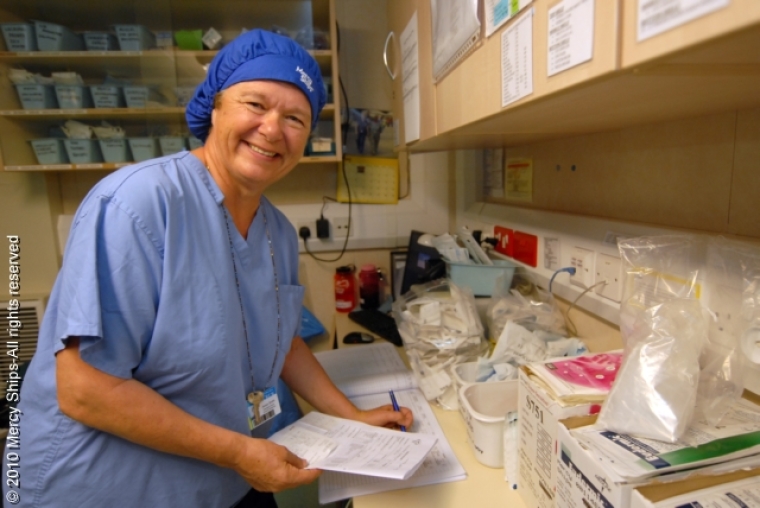
"The time I spent there reinforced two things for me," she says. "One is my resolve to return to Africa to help the people who live in some of the world's poorest nations. The other is the recognition of our living in a country where we never have to worry about the availability of healthcare services."
Jacqui heard about the work being done by volunteers serving with Mercy Ships from a presentation made at a nursing conference. "I have always felt that I wanted to do some kind of voluntary aid work. At the time of hearing about what goes on onboard the Africa Mercy with its six operating theatres and 78-bed hospital I sensed the opportunity was the right time to take advantage of it. I made contact through the charity's website and filled in the application form. I have to admit I had never heard of Togo before making my application and had to look it up on a map."
"Then it was off at my own expense, in keeping with all other volunteers, on the flight to Togo. After working for 30 years in operating theatres, I felt it would be a shame to let all that experience go to waste after I retired. My time onboard was spent assisting with a variety of operations aimed at correcting disability, deformity and blindness.
Jacqui says living on the ship provided a very safe environment, but going into town and through the country made her very aware that many who live in Africa are very poor. "The great thing about what I was involved in was to see the results in patients who had been forced to live with health problems for many years. Some conditions were life-threatening or so disfiguring that they had been ostracized by their families and communities. It was wonderful to watch the faces of patients who could now see themselves without disfigurement. Local doctors were also being trained onboard so they could provide more help in the hospitals of Togo."
"The only downside to the whole experience was the recognition that during the eight-month assignment by Mercy Ships to Togo this year was not long enough to help the huge number of people still requiring surgery."
"Every Friday there is a ceremony called 'Celebration of Sight'. It's a time when those who have received free eye surgery, mostly removal of cataracts, have a celebration and give thanks to God for restoration of their sight. They sing and dance. Some tell their stories of what life was like before surgery, how they came to be on the big white ship, and what life is like now that they can see again."
Mercy Ships is a global charity that has operated hospital ships in developing nations since 1978 providing free health care and community development services to the forgotten poor. Following the example of Jesus, Mercy Ships brings hope and healing to the poor. Working in partnership with local people, Mercy Ships empowers communities to help themselves. The result is a way out of poverty.
The emphasis is on the needs of the world's poorest nations in West Africa, where the world's largest charity hospital ship Africa Mercy provides the platform for services extending up to ten months at a time. Mercy Ships works on land-based projects in Sierra Leone in partnership with other organisations, while teams also work in several nations of Central America and the Caribbean. Mercy Ships Australia, one of 14 international support offices is based on the Queensland Sunshine Coast.
On the web: www.mercyships.org.au